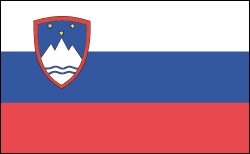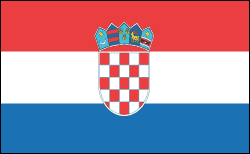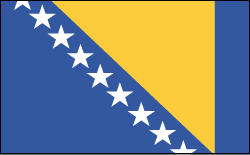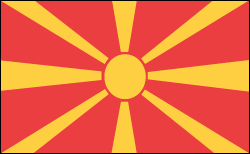Guide to New Nations: Slovenia, Croatia, Bosnia and Herzegovina, Macedonia

Former Yugoslavia
by David Johnson |
| Slovenia The former Yugoslavian republic of Slovenia declared its independence on June 25, 1991. The Serbian-led Yugoslavian army, briefly attempted to keep Slovenia from seceding, but after brief fighting withdrew its forces. The European Community recognized Slovenian independence in 1992. |  Slovenia Flag |
 | Croatia The second-most industrialized area of Yugoslavia, (after Slovenia), Croatia declared its independence on June 25, 1991. A bloody six-month long civil war ensued, as the Yugoslavian army sought to keep Croatia from seceding and to protect the majority-Serb population in the Croatian regions of Krajina and eastern Slavonia. A cease-fire was declared in 1992, and United Nations peacekeepers were sent to Croatia. In 1994, the Croatian army recaptured areas under Serb control. In 1998 the U.N. returned Eastern Slavonia to Croatia. Since then, Croatia has sought to rebuild its economy and resettle thousands of refugees displace by the war. |
| Bosnia and Herzegovina Of all the new nations to break away from the Soviet Union or Yugoslavia, none has had as difficult a time as Bosnia and Herzegovina. Vicious ethnic warfare and an intervention by the Yugoslavian military have left tens of thousands dead and created one million refugees, nearly one-third of the population. After a 1992 referendum ratified Bosnian independence, Bosnian Serbs, backed by the Yugoslavian army, began an aggressive campaign to create a "Greater Serbia," and eliminate Muslims from areas under their control. With Bosnian Croats, Serbs, and the Muslim-dominated government all forming armies, thousands of people were killed, many massacred because of their religion. Serbs ended the siege of Sarajevo in 1994. The 1995 Dayton Peace Accord partitioned the country along ethnic lines, creating the Muslim/Croat Federation and the Bosnian Serb Republic. NATO troops remain in Bosnia to keep the peace as the government gradually rebuilds the country and revives the shattered economy. Meanwhile, Bosnia depends heavily on billions in foreign aid. |  Bosnia and Herzegovina Flag |
 | Macedonia An autonomous republic under the former Yugoslavia, Macedonia declared its independence on January 17, 1991. More than a year later, six European nations recognized Macedonia's independence. Later, the U.N. and the U.S. recognized Macedonia. Greece slapped an economic embargo the new nation, objecting to its use of the name "Macedonia." The embargo was lifted in 1995. The country is officially known as the Former Yugoslav Republic of Macedonia. |




